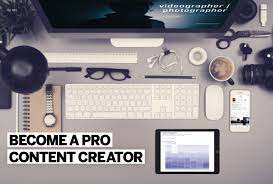Crafting Compelling Content: The Art of a Media Content Creator
The Role of a Media Content Creator in the Digital Age
In today’s digital age, the role of a media content creator has become increasingly important. With the rise of social media platforms, online streaming services, and digital marketing, the demand for engaging and high-quality content has never been higher.
A media content creator is responsible for producing various forms of media content, including videos, articles, images, and social media posts. They play a crucial role in capturing the attention of audiences and conveying messages effectively.
One key aspect of a media content creator’s role is to stay updated with current trends and audience preferences. By understanding what resonates with their target audience, creators can tailor their content to maximise engagement and reach.
Moreover, media content creators need to possess strong creative skills to develop compelling and original ideas. Whether it’s creating viral videos, writing captivating articles, or designing eye-catching graphics, creativity is at the core of their work.
Additionally, with the increasing focus on visual content in today’s digital landscape, proficiency in multimedia tools and editing software is essential for a media content creator. They must be able to produce polished and professional-looking content that stands out amidst the online noise.
Furthermore, collaboration is often a key aspect of a media content creator’s role. Working closely with graphic designers, videographers, writers, and marketing teams allows creators to leverage diverse skills and perspectives to produce comprehensive and impactful content.
Overall, the role of a media content creator is dynamic and multifaceted. From ideation to execution, they are instrumental in shaping brand identity, engaging audiences, and driving results in today’s fast-paced digital landscape.
Exploring the Role of a Media Content Creator: Key Questions and Insights
- What is a media content creator?
- What does a media content creator do?
- What skills are required to become a media content creator?
- How does a media content creator engage with their audience?
- What tools and software are commonly used by media content creators?
- How important is creativity in the role of a media content creator?
- How can someone become a successful media content creator?
- What are the different types of media content that creators produce?
- How has the role of a media content creator evolved in the digital age?
What is a media content creator?
A media content creator is an individual responsible for crafting and producing various forms of content across different media platforms, such as videos, articles, images, and social media posts. Their role involves generating engaging and high-quality content that resonates with target audiences, conveys messages effectively, and drives engagement. Media content creators must stay updated on current trends and audience preferences to tailor their content for maximum impact. With a focus on creativity, multimedia skills, and collaboration with other professionals, media content creators play a vital role in shaping brand identity, capturing attention in the digital landscape, and delivering compelling storytelling experiences to audiences.
What does a media content creator do?
A media content creator plays a pivotal role in the digital realm by crafting engaging and diverse content across various platforms. Their responsibilities encompass generating compelling videos, articles, images, and social media posts that resonate with target audiences. By staying abreast of current trends and audience preferences, content creators tailor their creations to captivate viewers and convey messages effectively. With a strong emphasis on creativity, proficiency in multimedia tools, and collaboration with a range of professionals, media content creators are instrumental in shaping brand identity, driving engagement, and achieving impactful results in today’s dynamic digital landscape.
What skills are required to become a media content creator?
To become a successful media content creator, a diverse set of skills is essential. Firstly, creativity is paramount in generating original and engaging content that captures audience attention. Strong communication skills are also crucial for effectively conveying messages through various media formats. Technical proficiency in multimedia tools and editing software is necessary to produce high-quality content. Additionally, adaptability and the ability to stay updated with industry trends are vital for remaining relevant in the ever-evolving digital landscape. Collaboration skills to work with other creatives and marketing teams, as well as analytical abilities to measure content performance and make data-driven decisions, are also key attributes for aspiring media content creators.
How does a media content creator engage with their audience?
A media content creator engages with their audience through various strategic approaches aimed at fostering connection and interaction. They utilise platforms such as social media, websites, and online forums to share compelling content that resonates with their target audience. By understanding the preferences and interests of their viewers, creators tailor their content to evoke emotions, spark conversations, and encourage participation. This can include responding to comments, hosting live Q&A sessions, running polls or contests, and seeking feedback to create a dialogue that enhances engagement and builds a loyal community of followers. Through consistent communication and genuine interaction, media content creators effectively engage with their audience, ultimately strengthening relationships and driving continued interest in their content.
What tools and software are commonly used by media content creators?
Media content creators utilise a variety of tools and software to bring their creative visions to life. Commonly used tools include Adobe Creative Suite, which encompasses applications like Photoshop for image editing, Premiere Pro for video editing, and Illustrator for graphic design. Content creators also rely on tools such as Canva for quick graphic design projects, Audacity for audio editing, and Hootsuite for social media management. Additionally, popular software like Final Cut Pro, Avid Media Composer, and DaVinci Resolve are preferred choices for video editing tasks. These tools empower media content creators to produce high-quality and engaging content across different digital platforms effectively.
How important is creativity in the role of a media content creator?
Creativity plays a pivotal role in the realm of media content creation, serving as a cornerstone for innovation and engagement. As a media content creator, the ability to think outside the box, develop fresh ideas, and craft compelling narratives is paramount in capturing audience interest and fostering brand loyalty. Creativity not only sets content apart in a saturated digital landscape but also enables creators to adapt to evolving trends and effectively communicate messages that resonate with diverse audiences. In essence, creativity is not just important but essential in shaping the success and impact of a media content creator’s work.
How can someone become a successful media content creator?
Becoming a successful media content creator requires a combination of creativity, dedication, and strategic thinking. Firstly, it is essential to identify your niche and target audience to create content that resonates with them. Developing strong storytelling skills and staying updated on current trends in the industry can help you produce engaging and relevant content. Building a strong online presence through social media platforms and networking with other creators can also enhance visibility and reach. Consistency in creating high-quality content, adapting to feedback, and continuously learning and evolving your skills are key factors in establishing yourself as a successful media content creator in today’s competitive digital landscape.
What are the different types of media content that creators produce?
Media content creators produce a wide range of content to engage audiences across various platforms. Some common types of media content include videos, articles, blog posts, infographics, podcasts, social media posts, photographs, animations, and live streams. Each type of content serves different purposes and caters to diverse audience preferences. Video content is popular for its visual appeal and storytelling capabilities, while articles and blog posts provide in-depth information and analysis. Infographics are effective for presenting complex data in a visually appealing format, while podcasts offer an audio-based platform for discussions and interviews. Social media posts help maintain audience engagement and build brand awareness, while photographs capture moments and convey emotions effectively. With the evolving digital landscape, media content creators continue to explore new formats and technologies to create innovative and engaging content for their audiences.
How has the role of a media content creator evolved in the digital age?
In the digital age, the role of a media content creator has undergone significant evolution. With the proliferation of online platforms and the shift towards digital consumption, creators now face a more dynamic and competitive landscape. The traditional boundaries of content creation have expanded, requiring creators to adapt to new formats, trends, and technologies to capture audience attention effectively. The rise of social media and streaming services has also transformed how content is distributed and consumed, necessitating creators to be agile in their approach and responsive to changing audience preferences. In this ever-evolving digital ecosystem, media content creators are not just storytellers but also strategists, data analysts, and community builders, shaping brand narratives and engaging audiences in innovative ways.





